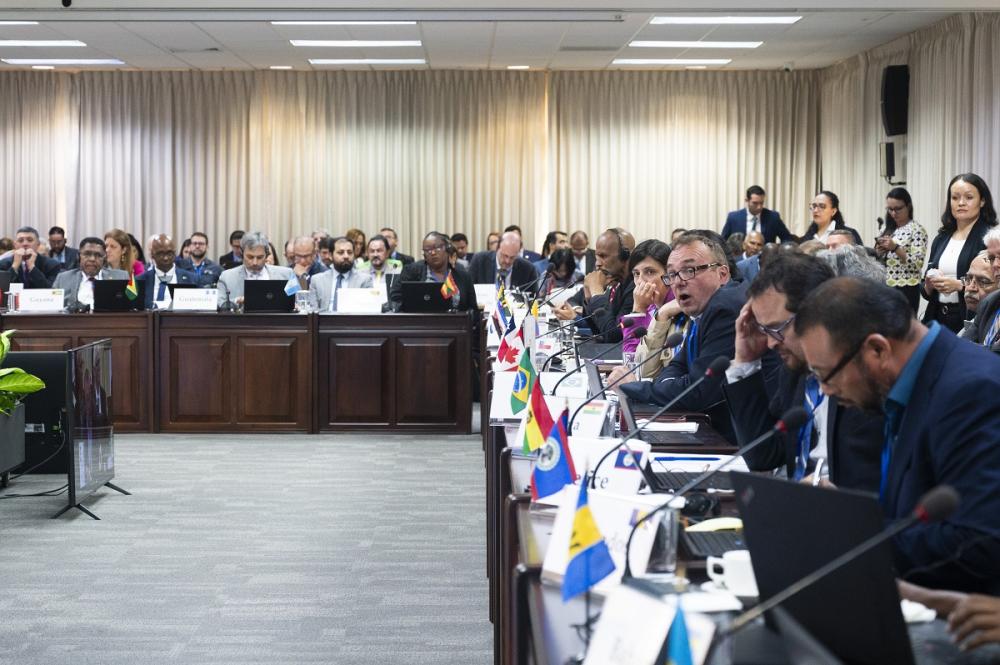IICA’s headquarters in Costa Rica has welcomed around 12,000 visitors in 2023, mostly children and young people, who have learned about the use of cutting-edge technologies and experimented with drones, robotics, 3D, satellite information and programming, all of which are essential tools for a more sustainable, attractive, dynamic, inclusive and profitable agriculture.
San Jose, 28 November 2023 (IICA). In addition to supporting the informed participation of the agricultural sector in the main global climate negotiations and action forums, the Inter-American Institute for Cooperation on Agriculture (IICA) consolidated its “IICA of Open Doors” initiative in 2023, in its headquarters in San Jose, Costa Rica, making it a hub for the innovation and transformation of the continent’s agrifood systems, as well as for fostering sustainable agriculture and promoting the application of digital technologies in the hemisphere’s agriculture.
Under this initiative, IICA has received at its headquarters nearly 12,000 visitors of all ages so far this year, from all the countries of the Americas as well as from Europe, Asia and Africa. These visitors participated in more than 130 guided tours of the “IICA of Open Doors” project, which seeks to bring the work of this international organization closer to their communities, as well as expand knowledge about the most current practices in sustainable and digital agriculture.
The majority of visitors are children and young people (75 tours have been offered to schoolchildren, high school students and university students), who can learn about the use of cutting-edge technologies and experiment with drones, robotics, augmented reality, programming and satellite information applications, and other technologies that show agriculture as an attractive, dynamic, inclusive and profitable activity.
“IICA of Open Doors helps disseminate and raise interest in productive, efficient, inclusive and sustainable agriculture among the new generations, promotes generational change in agriculture, and builds a knowledge hub in the Americas”, stated Manuel Otero, Director General of the Institute.
In this sense, as an innovation hub and a true bridge between rural and urban areas, the “IICA of Open Doors” works to raise awareness about the new frontier of knowledge that transforms agriculture and the need to promote a generational change in agriculture, exhibiting the opportunities that the sector offers.
The hub also contributes to strengthening the role of agriculture in the Americas as a guarantor of food security and environmental sustainability, within the framework of global environmental negotiations on the changes that must occur in agriculture to reduce greenhouse gas emissions, while transforming traditional commodity-based agriculture into a sector with differentiated products, making substantive contributions to the preservation of natural resources, biodiversity and the life cycle of water and oxygen.
The “IICA of Open Doors” initiative features the Interpretive Center for Tomorrow’s Agriculture (CIMAG), an interactive educational space with various exhibits that show the technologies that transform regional agriculture; the Digital Fabrication and Community Innovation Laboratory ( FabLab -LINC); the Typical Rural House, which evokes the rural traditions of our continent; the Forest of the Americas, endowed with tree species representative of the entire hemisphere and which shows how agriculture and environmental conservation come together; and the Plaza of Agriculture of the Americas, a public square at the Institute’s entrance that connects IICA with the Costa Rican community and highlights the value of agriculture, biodiversity and its importance for society.
This ambitious IICA institutional transformation project is completed by the agriculture and urban art mural, and the AgroArt virtual art museum. All the initiatives of its open door policy can be found on the IICA 3D web platform.

Due to its popularity and wide acceptance, at the beginning of 2024 the “IICA of Open Doors” tour will be available in virtual format on its website www.iica.int, in order to reach more users in the Americas and the rest of the world. In the interactive tour, people will have access to the different spaces of the initiative and will be able to see the exhibits and general content. A mobile application is also being developed and will be available soon.
“We are creating spaces that allow children, young people and adults to actively convert knowledge into action, through experiential spaces combining technology and agriculture, art and science, which serve as drivers of rural development with a clear significance for the future”, Otero added.
Agricultural connection point
IICA’s headquarters in San José have also become a center for dialogue and knowledge on agriculture, rurality and international technical cooperation, attracting a high number of visitors regularly. In 2023, it hosted more than 325 in-person events, mostly high-level and priority events for the future of the agricultural sector in the Americas, with the participation of nearly 9,000 people.
The meetings resulted in a series of joint actions to strengthen the role of the continent’s agriculture as a guarantor of global food and nutritional security and sustainability, in times of climate, economic and war crises, and with changes in the international context that require a modern, more productive and resilient agriculture.

Some of the most relevant meetings include the Conference of Ministers of Agriculture of the Americas, which took place in early October with agricultural authorities from the 34 Member States of IICA, the presidents of Guyana, Mohamed Irfaan Ali, and of Panama, Laurentino Cortizo, the 2019 Nobel Prize winner of Economics, Michael Kremer, the 2020 World Food Prize winner, Rattan Lal, and representatives of the private sector and rural leaders of the region.
Other events include the IV Forum of Female Ministers, Deputy Ministers and Senior Officials of the Americas, in August; the Pan-American Liquid Biofuels Summit, in March: the Digital Agriculture Week between May and June; and high-level technical dialogues for the creation of the Hemispheric Partnership for Food Security and Sustainable Development, between July and October. Furthermore, the Minecraft Education Challenge for agriculture, aimed at high school students in Costa Rica, which ended in November with an awards ceremony; the National Robotics Championship and the women’s rallies that helped train hundreds of rural Costa Rican women in the use of drones, electronic prototyping and 3D printing to address challenges in their communities.
These activities confirm the role of the Institute’s headquarters as a meeting point for initiatives seeking to exchange knowledge and accelerate the transformation of agriculture in the Americas.
“As part of this process we have promoted the digital transformation of agriculture through co-creation spaces, increasing ownership of these innovative technologies so that they can serve as exchange platforms. In this way, IICA seeks to become a bridge that facilitates knowledge of the past, present and future of agriculture, and unites regions, themes and countries, so that knowledge can be better managed and reach more people”, concluded Manuel Otero.
More information:
Institutional Communication Division.
comunicacion.institucional@iica.int











